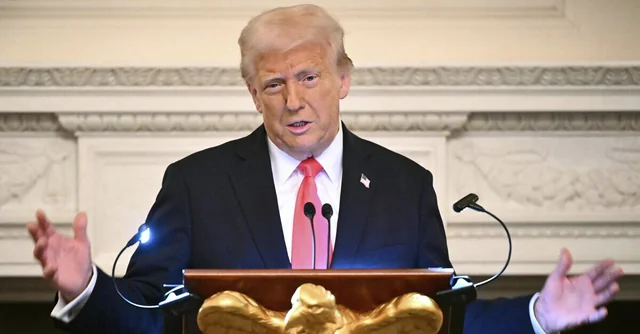Conservative Group Takes Aim at Trump Tariffs, Calling Them an Illegal Power Grab
A prominent conservative legal group has filed a lawsuit against former President Donald Trump, arguing that his newly proposed tariffs on Chinese imports are unconstitutional. The group, the New Civil Liberties Alliance (NCLA), says Trump is taking powers that belong to Congress — and using a decades-old emergency law in a way it was never intended.
The lawsuit, filed on behalf of a Florida-based paper goods company called Emily Ley Paper Inc., takes direct aim at Trump’s use of the International Emergency Economic Powers Act (IEEPA) to justify a 20% tariff on all goods coming from China. The company says the tariffs are hurting its business, and the NCLA says they’re also breaking the law.
This isn’t just a policy disagreement. It’s a rare moment when conservatives are suing a Republican leader over government overreach — an issue usually championed by the political right.

Why the Lawsuit Was Filed
The case centers around the idea of separation of powers — specifically, who has the authority to regulate trade. The U.S. Constitution gives Congress the power to impose tariffs and manage international commerce. While presidents have gained some authority over trade decisions through laws passed in the 20th century, critics say Trump is pushing those powers too far.
Trump argues he’s acting under IEEPA — a law from the 1970s designed to let the president respond quickly to national emergencies involving foreign threats. In this case, Trump declared a national emergency over China’s role in the fentanyl crisis, and used that to impose the tariffs.
The NCLA says that’s not how the law is supposed to work. “IEEPA wasn’t written to let the president act like Congress and slap tariffs on foreign goods whenever he wants,” said an attorney from the group.
Reactions from Capitol Hill
Lawmakers from both parties are paying close attention. Several Republicans in Congress, including longtime Senate voices on trade like Chuck Grassley, have already expressed concern about Trump’s approach. Grassley warned that invoking national emergency laws to impose tariffs could set a dangerous precedent — and risks damaging relationships with U.S. allies and trade partners.
“There’s a difference between using emergency powers in a real crisis and using them to push your economic agenda,” Grassley said in a recent interview.
Even members of Trump’s own party are cautious. While many support strong trade measures against China, they’re uneasy about how those actions are being carried out — especially if it means cutting Congress out of the decision-making process.
Economic Concerns Growing
Beyond the legal arguments, there’s growing concern about the real-world fallout of the tariffs. Wall Street has reacted nervously, with major tech companies like Apple seeing drops in stock value. Economists warn that the tariffs could lead to higher prices for consumers, disrupt supply chains, and even risk pushing the country toward a period of slow growth and rising inflation — a toxic mix known as stagflation.
Business owners, especially small and midsize ones like Emily Ley Paper Inc., say they’re being caught in the crossfire. Their products depend on affordable imports from China, and the new tariffs could force them to raise prices, lay off staff, or shut down production.
What Happens Next?
This lawsuit could have far-reaching effects, both legally and politically. If a court sides with the NCLA, it could limit how future presidents use emergency powers to shape trade policy. That would be a major check on executive authority — and a big win for those who believe Congress should have the final say on economic decisions that affect millions of Americans.
Legal experts say the courts have traditionally given presidents wide leeway in national security and trade matters, but that could change if judges find Trump’s use of the IEEPA goes too far.
As the case moves forward, it may become a major test of where the line lies between national emergency actions and unconstitutional overreach — a debate that could shape U.S. trade policy for years to come.


Comments are closed, but trackbacks and pingbacks are open.